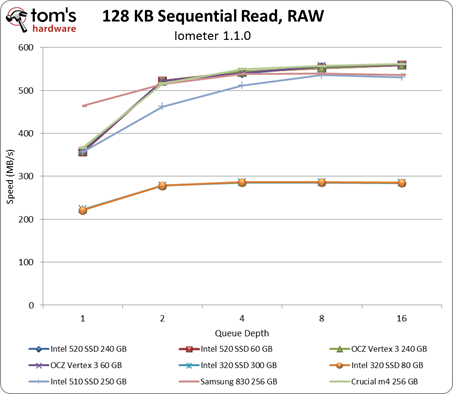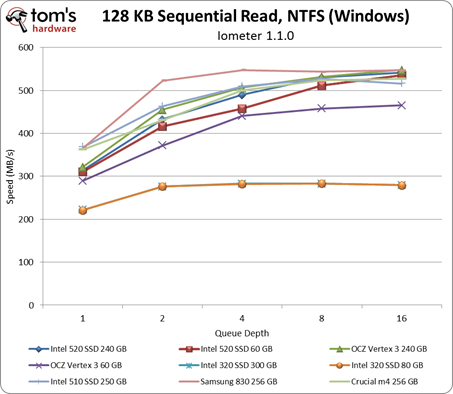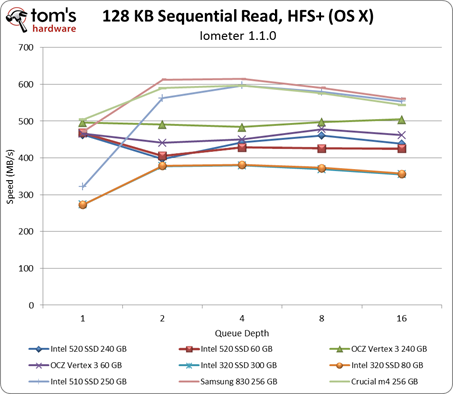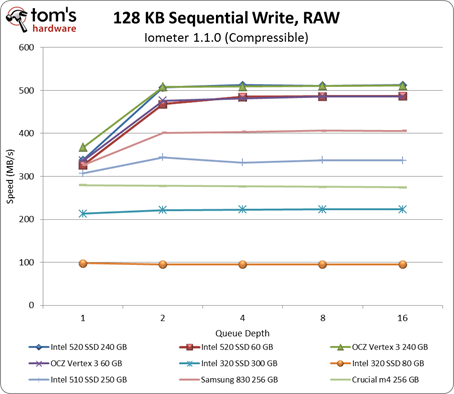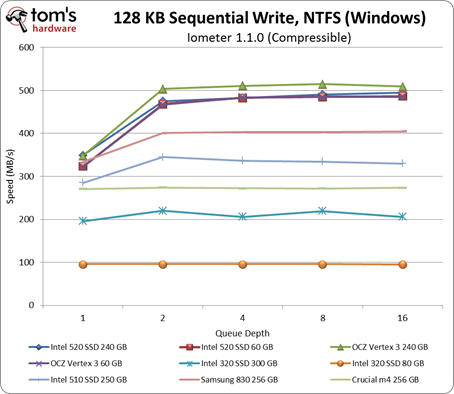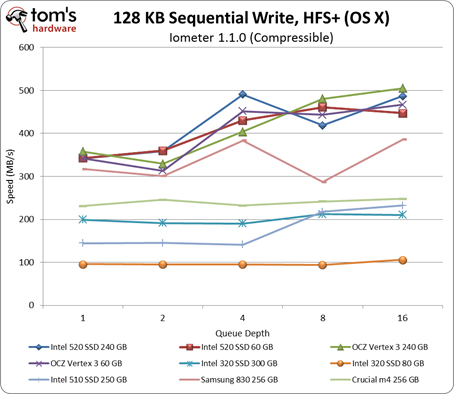Intel SSD 520 Review: Taking Back The High-End With SandForce
128 KB Sequential Performance: Raw, Windows, And Mac
Sequential Read Performance
Examples include file copying, transcoding, game level loading, some gameplay, watching video, and editing video
In sequential reads, Intel's latest SSD finds its way to the top of our chart like a champ. The 240 GB and 60 GB SSD 520s are able to match the read speeds of the 256 GB m4 and both Vertex 3s. It's only at a queue depth of one where Samsung's 256 GB 830 enjoys a 100 MB/s lead.
The most obvious story is the gaping performance hole between SATA 3Gb/s- and 6Gb/s-capable drives. It's hard to see, but both SSD 320s offer identical sequential read rates just under 300 MB/s at queue depths higher than two. The rest of the pack consists of SATA 6Gb/s-class SSDs, helping explain why those drives show up at 350 MB/s and scale up as high as 550 MB/s.
Faced with the overhead of NTFS, the group becomes a little easier to separate. At queue depths between two and four, Samsung's 830 takes the lead. Meanwhile, the 60 GB SSD 520 falls slightly behind, though Intel's lowest-capacity SandForce-based SSD still managers to outperform the 60 GB Vertex 3.
In a Mac environment, all of the SSDs are affected by host caching, which is why you see most drives start around 500 MB/s. Interestingly, only the 256 GB m4 and 830 maintain those speeds, eventually punching through the 600 MB/s barrier, which we know exceeds the SATA 6Gb/s interface's ceiling.
As far as the SandForce-based SSDs are concerned, we still see the opposite outcome of our PC-based tests. This time, both Vertex 3s outperform Intel's SSD 520s. Granted, the delta is relatively small. We're still talking about very fast SSDs, and all four SandForce-based SSDs are capable of delivering speeds close to 500 MB/s.
Get Tom's Hardware's best news and in-depth reviews, straight to your inbox.
Sequential Write Performance
Examples include Application Installation, Document Backup
When it comes to writing compressible data, the SSD 520s match the Vertex 3's performance at nearly every queue depth. That's great considering all four SandForce-based SSDs outperform Crucial's m4 and Samsung's 830.
Interestingly, Crucial's 256 GB m4 and Intel's older SSD 510 seems to suffer some sort of performance penalty on our MBP.
Current page: 128 KB Sequential Performance: Raw, Windows, And Mac
Prev Page 4 KB Random Performance: Raw, Windows, And Mac Next Page Incompressible Performance: SandForce's Weakness-
phamhlam I love Intel SSD. 128GB for about $210 isn't bad. It is just hard to not chose something like a Corsair GT 120GB that cost $150 with rebate over this. I would always put a Intel SSD in a computer for novice since it is reliable.Reply -
jaquith Nice article :)Reply
Just need more SSD's to compare, I'd like to see similar tests done with 120GB...180GB...256GB and several more brands. Further, as I mentioned before in the other article please list the exact model numbers and OEM specs including their 4KB IOPS; otherwise folks don't understand the results and if relying on this a purchasing will have in many cases a 4 in 5 chance of selecting the wrong SSD.
Prior article - http://www.tomshardware.com/reviews/sata-6gbps-performance-sata-3gbps,3110.html -
theuniquegamer costly but i think reliability comes at a price. These ssds are best for enterprises . If the price will be little lower then the common user can afford these and get a good reliable ssd.Reply -
bildo123 "Measuring boot time is one of the best illustrations of how an SSD benefits your computing experience." Be that as it may I find it almost irrelevant seeing as I hardly ever boot my computer, perhaps 2-3 times a month if that. Getting out of standby on my HDD is a matter of seconds.Reply -
danraies These prices are lower than I thought. $20-$40 extra (depending on the comparison) for peace-of-mind is not outrageous.Reply -
acku carn1xHmmm, maybe I missed a good excuse, but I'd like to see the Octane in these tests.Reply
We didn't have the Octane on hand in the 256 GB capacity, but we'll be sure to make that side by side comparison down the road.
phamhlamI love Intel SSD. 128GB for about $210 isn't bad. It is just hard to not chose something like a Corsair GT 120GB that cost $150 with rebate over this. I would always put a Intel SSD in a computer for novice since it is reliable.
Excellent point. Price is always a fickle thing.
thessdreviewNice Review!Thanks Les. :)
jaquithNice article Just need more SSD's to compare, I'd like to see similar tests done with 120GB...180GB...256GB and several more brands. Further, as I mentioned before in the other article please list the exact model numbers and OEM specs including their 4KB IOPS; otherwise folks don't understand the results and if relying on this a purchasing will have in many cases a 4 in 5 chance of selecting the wrong SSD. Prior article - http://www.tomshardware.com/review ,3110.html
We'll keep that mind for future reviews. However, we already list model and firmware on the test page.
Cheers,
Andrew Ku
TomsHardware.com
-
willard bildo123Getting out of standby on my HDD is a matter of seconds.And with an SSD, your computer comes out of standby faster than your monitors do. Not kidding.Reply -
mrkdilkington Anyone else disappointed Intel isn't producing their own high end chipset? Been waiting to upgrade my X25-M for a while now (Intel 320 isn't a big upgrade) but might just go with Samsung.Reply
